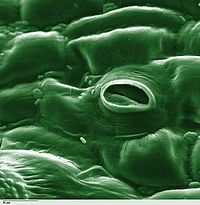
Photo from wikipedia
Strigolactones (SLs) are known to mediate plant acclimation to environmental stress. We recently reported that SLs acted as prominent regulators in promotion of stomatal closure. However, the detailed mechanism by… Click to show full abstract
Strigolactones (SLs) are known to mediate plant acclimation to environmental stress. We recently reported that SLs acted as prominent regulators in promotion of stomatal closure. However, the detailed mechanism by which SLs induce stomatal closure requires further investigation. Here we studied the essential role of the calcium (Ca2+) signal mediating by the calcium-dependent protein kinase (CPK) in SL-induced stomatal closure. SL-induced stomatal closure was strongly inhibited by a Ca2+ chelator and Ca2+ channel blockers, indicating that Ca2+ functions in SL promotion of stomatal closure. Through examining a collection of cpk mutants, we identified CPK33, potentially acting as a Ca2+ transducer, which is implicated in guard cell SL signaling. SL- and Ca2+-induced stomatal closure were impaired in cpk33 mutants. CPK33 kinase activity is essential for SL induction of stomatal closure as SL-induced stomatal closure is blocked in the dead kinase mutant of CPK33. The cpk33 mutant is impaired in H2O2-induced stomatal closure, but not in SL-mediated H2O2 production. Our study thus uncovers an important player CPK33 which functions as an essential Ca2+ signals mediator in Arabidopsis guard cell SL signaling.
Journal Title: Frontiers in Plant Science
Year Published: 2019
Link to full text (if available)
Share on Social Media: Sign Up to like & get
recommendations!